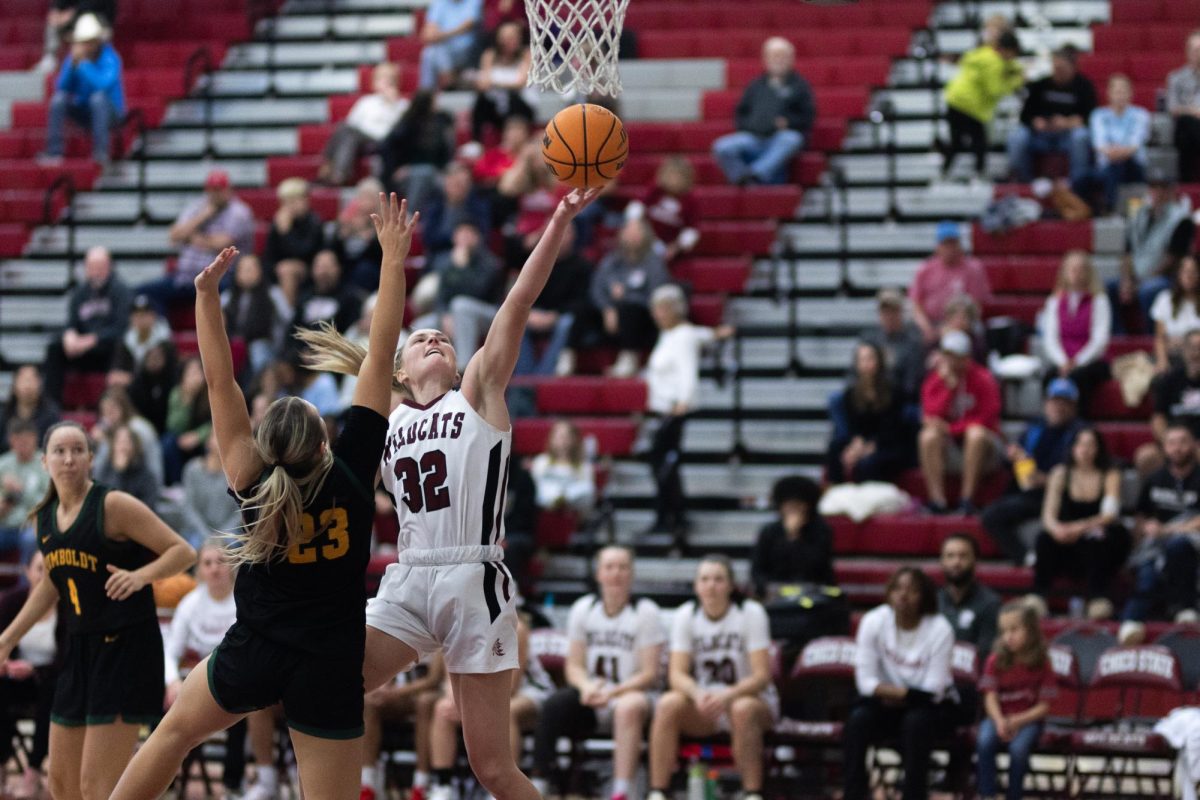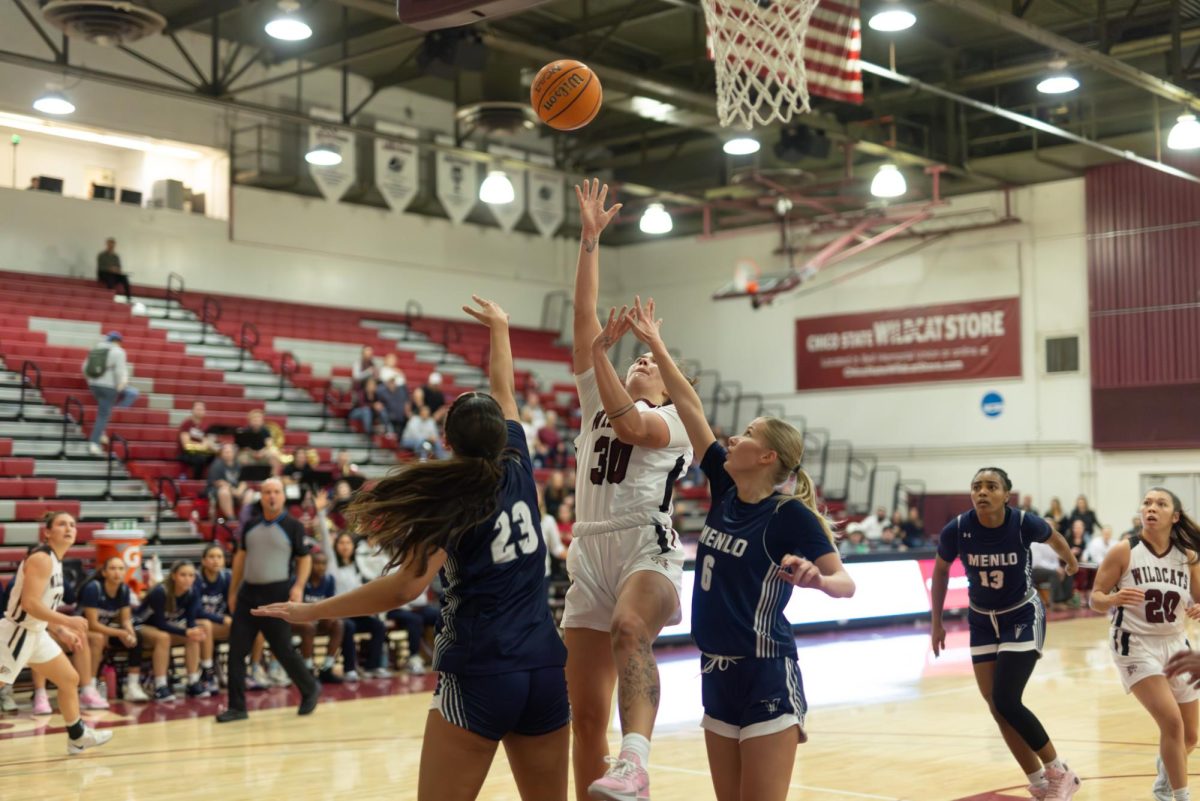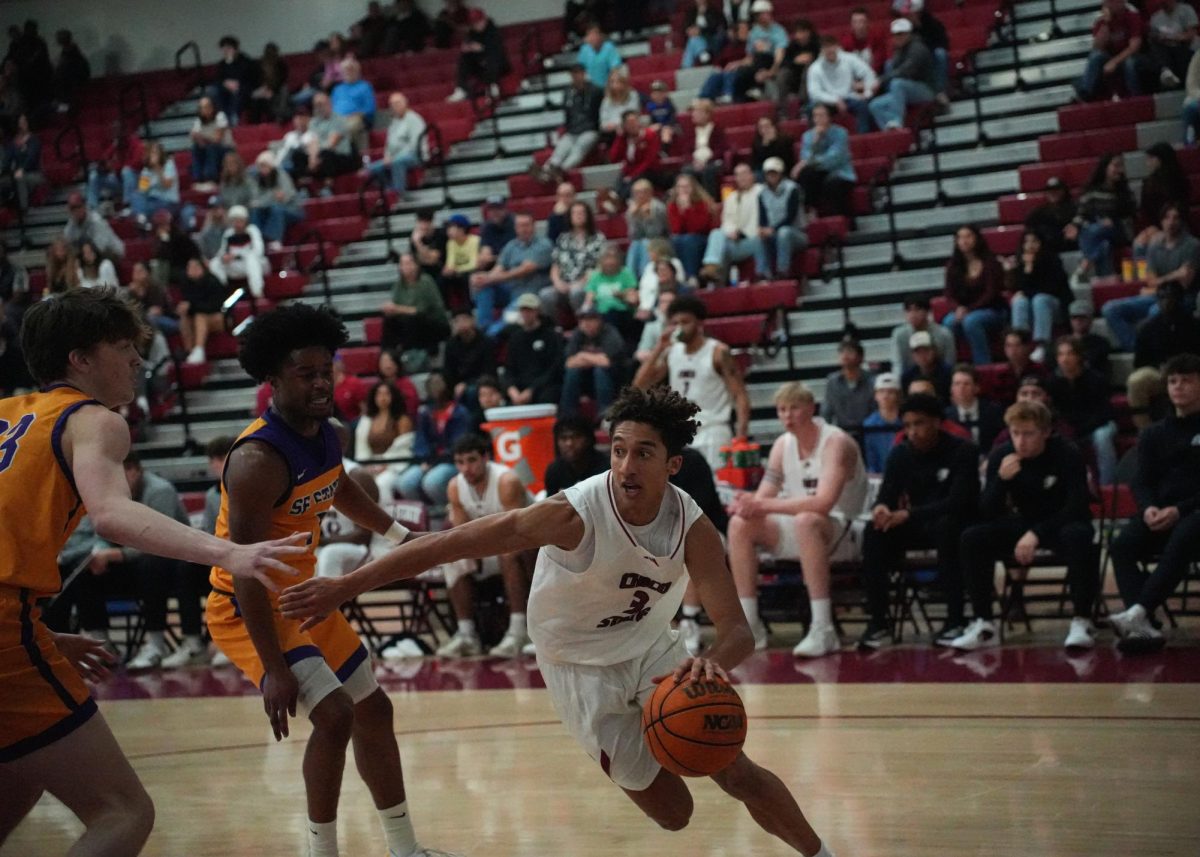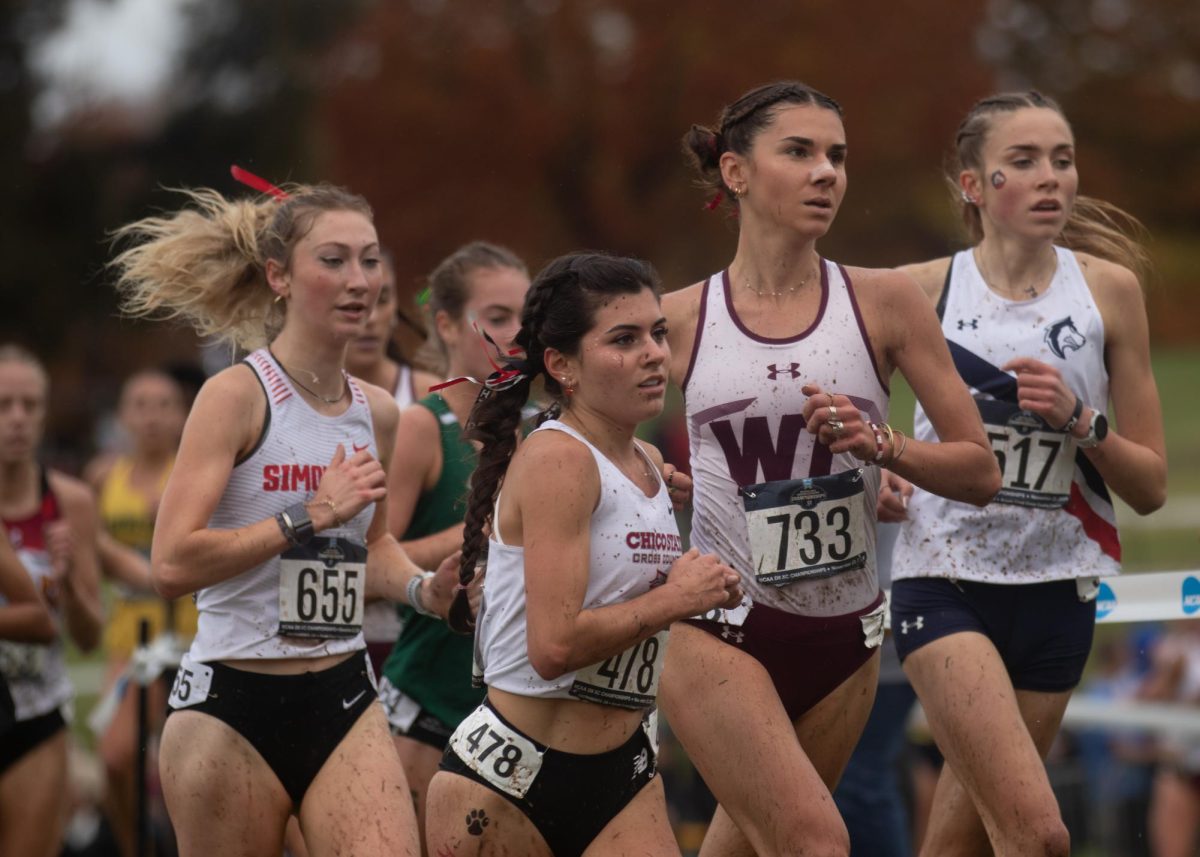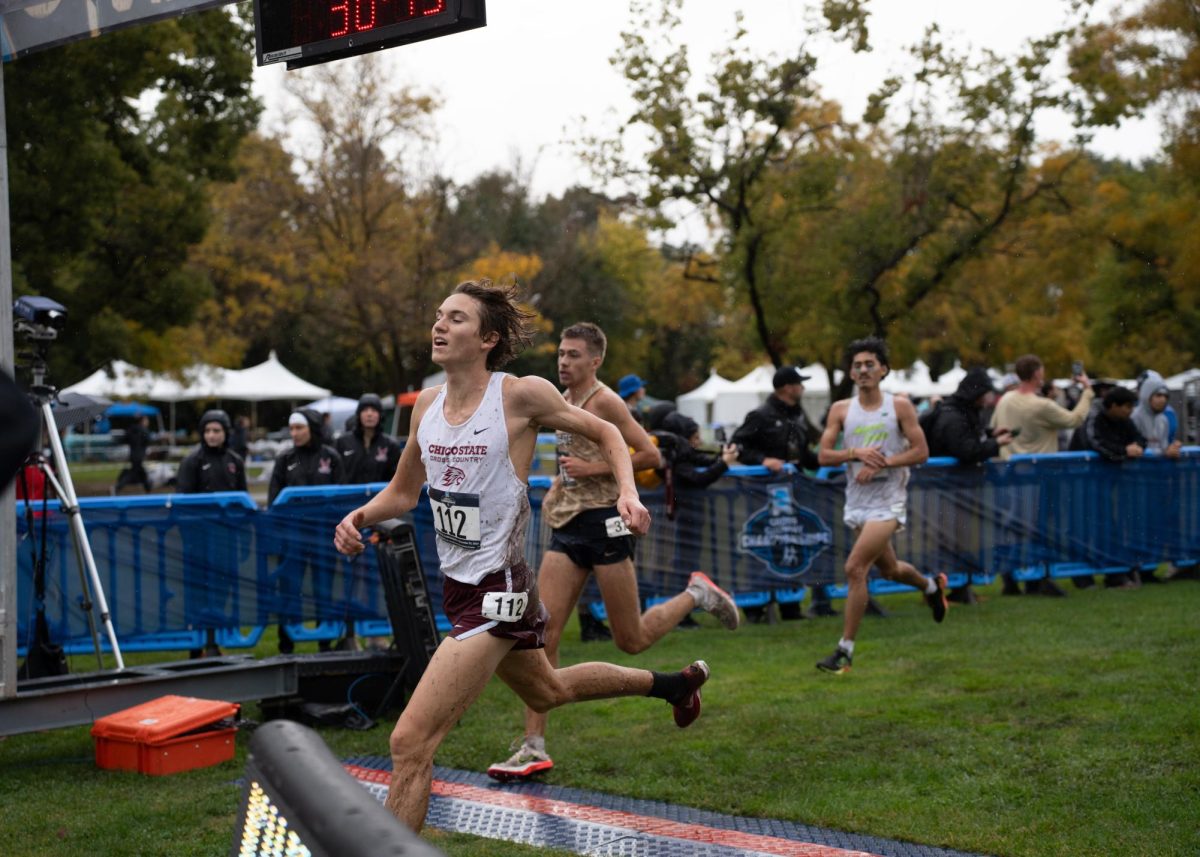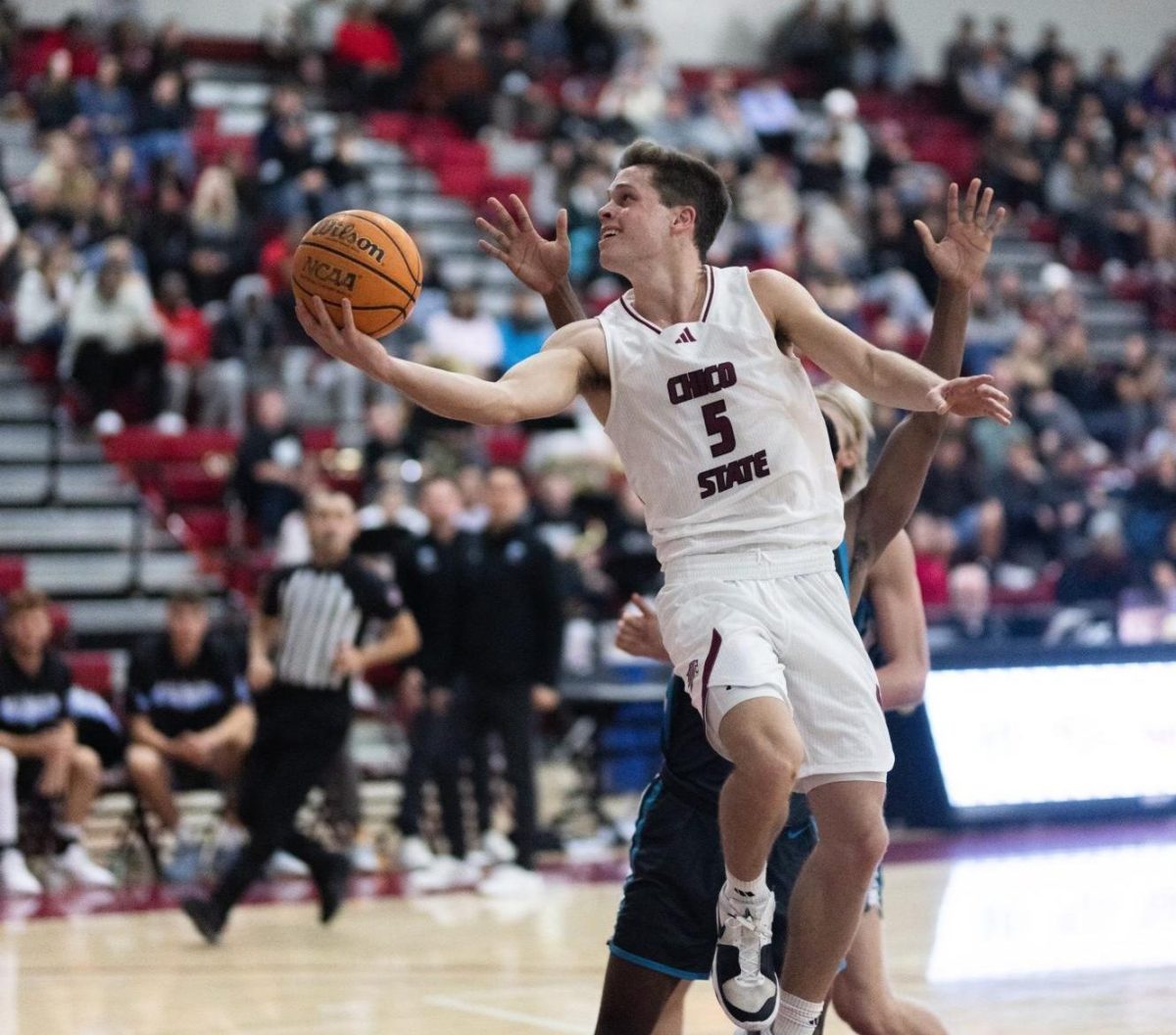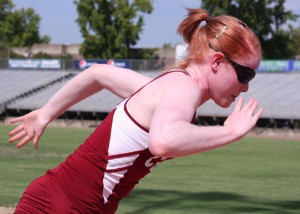
Kym Crosby bolts down the track at University Stadium.
In high school, Kym Crosby never thought she’d be able to run track at a higher level. But now, after two years of sprinting for Chico State, Crosby has run her way to an invitation to the Paralympics — all without the ability to see.
“I’m still amazed by it,” Crosby said. “I never in a million years thought I would get to this point.”
Crosby, who runs the 200 and 400-meter for Chico State’s women’s track and field team, has been visually impaired since birth. She is an albino, meaning she has no pigment in her hair, skin, or eyes. This causes twice as much light to reach her pupils and irises, resulting in the impairment.
A person with 20/100 vision is considered legally blind. Crosby has a vision of 20/400 in both eyes.
She can, however, see the lines of her lane on the track, which enables her to compete.
“I can tell something is there, I just can’t tell exactly what it is,” Crosby said.
Her visual impairment doesn’t stop her. Even as a child, she wouldn’t quit.
She was very active as a kid, a trait she’s carried with her through the years, said Paul Crosby, her father.
“Ever since she was little, she’s always wanted to do something,” Paul Crosby said. “She didn’t let it hold her back.”
Crosby can see things that are very close to her face and relies on memorizing what things look like up close. She played sports such as volleyball, basketball and tennis as a child, but it wasn’t until she became a sprinter that she experienced great success.
Crosby has been running since her freshman year of high school in Yuba City, with a little encouragement from her older brother.
“I actually didn’t want to do track, but my brother talked me into it,” Crosby said. “I gave it a shot and surprised myself, my parents and my coaches because I was pretty fast.”
She was fast. So fast that after she began running for Chico State, she received a bid to compete for the 2016 U.S Paralympics Team in Rio De Janeiro. Oliver Hanf, the head coach of the women’s track and field team, approached Crosby with the news last year.
It’s a very exciting time for her, and new territory for Hanf. Even after 16 seasons as a Chico State coach, he’s never had this happen to one of his runners.
“I’m super excited for her to get her chance to compete in the Paralympics,” he said. “She’s worked real hard and kept her motivation high.”
As long as Crosby competes for Chico State and approaches her personal bests in sprinting events, she will be headed to Brazil in 2016.
The Paralympics, not to be confused with the Special Olympics, is held two weeks after the Olympics in the exact same facilities. It is a multi-sport competition that shares many rules with its counterpart.
The athletes competing in the Paralympics fall into one of six categories: amputee, cerebral palsy, intellectual disability, wheelchair, visually impaired and Les Autres, which is the category for athletes whose conditions do not fall under any of the other classifications.
Within each category, there are classifications that distinguish the athletes. For example, there are three categories that a visually impaired runner could be placed in:
T11 is for runners who need a guide during the race.
T12 is for runners who don’t need a guide but may choose to have one.
T13 is for runners who do not need guides. This is the category Crosby will compete in.
Now that she’s a Wildcat runner working toward her kinesiology degree, Crosby doesn’t even think about her impairment.
“Honestly, sometimes I forget,” Crosby said. “Because I go about my day and things just happen.”
Even though she’s gotten used to her impairment, Crosby still faces challenges regularly. Sometimes she doesn’t get high-fives after she finishes a race because people are worried she might not see them, Crosby said. Sometimes she’s not invited to hang out after meets, which makes her feel excluded by her peers. But her guide dog, a 70-pound black labrador retriever named Keystone, helps break the ice.
“Feeling accepted has been a challenge,” she said. “Not everyone treats me the same. I can tell when people are scared to talk to me. But I’m just a normal person. Just because I can’t see and have a dog doesn’t make me any different.”
Crosby has faced acceptance issues off the track as well. Recently, she and her family were refused service by a local restaurant unless she kept Keystone outside. When she tried to explain that her guide dog was legally allowed inside, the management persisted in refusing service.
Another challenge Crosby faced was adjusting to a bustling college town away from her family, Hanf said.
“Certainly, all students have a challenge transitioning into college, he said. “With her visual impairment, she had problems just navigating campus. She’s been aware of her limitations, though, and never lets that stop her.”
But Crosby hasn’t faced these challenges alone.
“My mom, dad, and brother especially have always been there cheering me on since day one,” Crosby said. “They were behind me every step of the way.”
This support has helped her develop a competitive spirit that has stuck well into her collegiate career, Hanf said.
“She’s a fierce competitor,” Hanf said.
When it comes down to the actual race, Crosby tries not to think about the competition. Or anything else.
“I think about the most random things, but that’s how I get better times,” Crosby said. “I don’t think about the race. I just let my body go and don’t let my mind get in my way.”
She’s racked up many accomplishments, including being a collegiate runner and potential Paralympics athlete, in the midst of a situation that might leave others much less motivated, Hanf said.
“It’s a testament to her and her resolve,” Paul said. “A lot of people in her shoes would just sit back. But she’s never let anything take her down.”
Those accomplishments remind Crosby that she’s a role model for others, a position she cherishes.
“It makes me feel really good that people can look up to me,” she said. “Especially for other people who have disabilities. I can show them that it’s possible. Don’t let anyone or anything bring it down. Anything is possible and you can do what you want to do.”
Nicholas Woodard can be reached at [email protected] or @nwoodard25 on Twitter.



